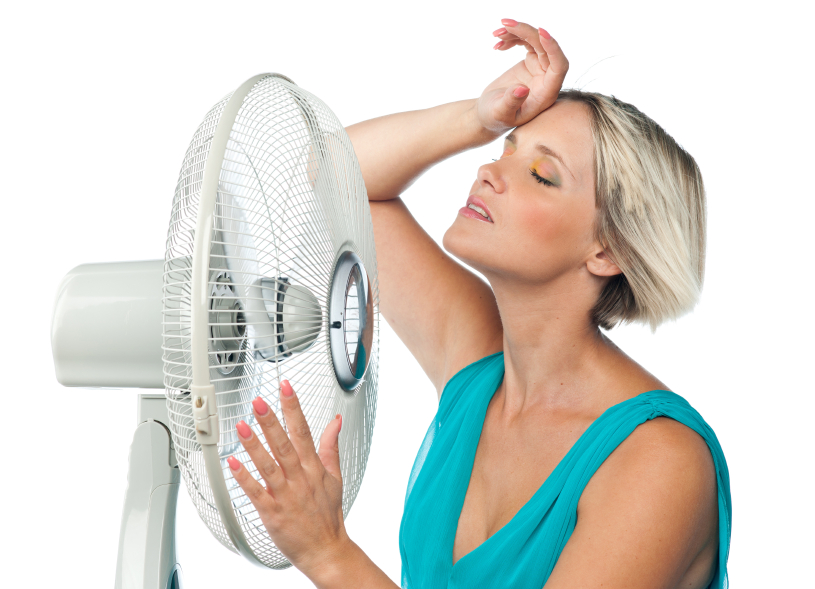Heat Intolerance
Nov 27, 2014
Heat intolerance, also referred to as sensitivity to heat, is more than just not liking extreme heat. It can make it impossible for the sufferer to be comfortable under warm weather. Heat intolerance is the body’s inability to regulate normal temperature, making life a struggle when the temperatures go up. The hypothalamus helps your body keep a delicate balance of temperature regulation between heat and cold. It does this by sending a signal to your body to produce sweat when it gets too warm. The sweat cools off the body as it evaporates. For some, this balance cannot be maintained.
What Does Heat Intolerance Feel Like?

When your body temperature increases, there are a number of symptoms that can be experienced. The most common symptom is dizziness and feeling very hot. Other symptoms can include sweating profusely, rapid pulse, feeling faint, nausea, vomiting, flushing, heart palpitations, and headaches. In severe cases you may experience chest pain, in which case you should see your doctor immediately. These symptoms will usually appear gradually as the condition worsens or after any physical activity.
What Causes Heat Intolerance?
There are a few causes for heat intolerance. These causes include:
- Menopause: Hot flashes are a common occurrence for most women during menopause. They can range from barely noticeable to feeling so overheated that you sweat profusely. Women can also experience heat intolerance without the usual hot flashes and it can be more than just uncomfortable. Heat intolerance during menopause is typically chronic, but will usually disappear within two years.
- Hyperthyroidism: The thyroid regulates hormones within the body and when the thyroid produces and excess of thyroid hormone, it can lead to heat intolerance, in addition to heart palpitations, excessive sweating, fatigue, muscle weakness, and weight loss. You should seek medical attention if you experience any of these symptoms and have your thyroid tested.
- Caffeine and Amphetamines: These are stimulants that increase the body’s metabolism and can cause heat intolerance by increasing blood flow, causing the skin to overheat and produce excessive sweating. With continued consumption of these stimulants as the outside temperatures rise, the symptoms can progressively get worse. Cut back on caffeine and discuss any medications you are taking that may contain amphetamines with your doctor.
- Chronic Conditions and Multiple Sclerosis: Certain conditions can be affected negatively by increasing outside temperatures and summer can worsen symptoms (pseudo-exacerbation). Though it might not produce the traditional symptoms of heat intolerance, it can manifest as making the existing symptoms of your condition worse.
What Can You Do About Heat Intolerance?
There are a number of ways to treat or alleviate heat intolerance and make you more comfortable in warmer weather. These include:
- Get your thyroid checked. If you have symptoms of overactive thyroid, see your doctor for testing. An overactive thyroid can cause heat intolerance, and treating your thyroid problem can eliminate the symptoms.
- Avoid caffeine and amphetamines. Eliminating or reducing caffeine intake can eliminate heat intolerance. Discuss with your doctor any medications you might be taking that contain amphetamines and look for alternatives.
- Drink plenty of fluids. Keeping hydrated can help keep your body cool and adding drinks with electrolytes can help your body maintain better body temperature control. Drinks that are low in sugar are preferred.
- Supplement with magnesium. Heat intolerance can be a symptom of stress or anxiety. In many cases, supplementing with magnesium can have a calming effect on the body, reducing stress and eliminating stress-related heat intolerance.
- Try black cohosh. If you are suffering from heat intolerance due to menopause, a supplement of black cohosh can help alleviate heat intolerance. Numerous studies have demonstrated its effectiveness for hot flashes and overheating.
- Avoid spicy foods. Spicy foods can cause the body to overheat due to the presence of capsaicin, which can cause a burning sensation. It is used in topical creams to alleviate pain, but it can cause heat intolerance. Limiting your intake of spicy foods can relieve symptoms.
- Dress in layers. If you wear multiple layers during the day, they can be easily removed to accommodate your increased body temperature and help you feel more comfortable.
- Wear breathable clothing. Clothing made of natural fibers such as cotton and linen allows your perspiration to evaporate, cooling off the skin and helping you feel more comfortable. You can also wear wicking fabric while exercising to remove excess perspiration from your skin.
 New Health Guide
New Health Guide
